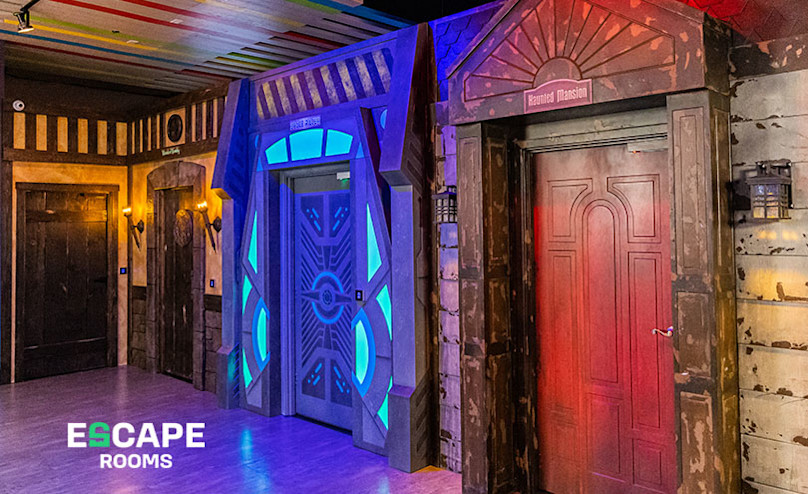Minneapolis Escape Room-- Exciting Puzzle Challenges for All Ages
Minneapolis Escape Room-- Exciting Puzzle Challenges for All Ages
Blog Article
Group Techniques: Just How to Collaborate Effectively in a Getaway Area
Browsing the complexities of a getaway area demands greater than mere interest; it requires a well-coordinated method grounded in clear communication, calculated function tasks, and skilled time management. Groups have to proactively listen to each member's insights, assign functions that align with specific toughness, and maintain regular check-ins to guarantee emphasis and prevent redundancy. By fostering a setting that values cohesion and versatility, groups can substantially increase their effectiveness and success rates. The nuances of these strategies can transform the experience, however how specifically can they be implemented to make the most of the potential for success?
Establish Clear Interaction

To facilitate clear communication, it is important to designate a central factor of contact for details dissemination. This function entails summarizing searchings for and proposed strategies to ensure everyone continues to be on the exact same web page. Furthermore, taking on a methodical approach to discussions can prevent chaotic exchanges. Quick, concentrated updates from each group member can maintain the team educated without overwhelming them with information - best escape room.
Assign Roles Strategically
While clear interaction sets the foundation for effective team effort, designating functions purposefully guarantees that each employee's toughness are made use of effectively. In a retreat area circumstance, the time-sensitive and intricate nature of difficulties necessitates a well-organized strategy to task delegation. By recognizing and leveraging specific expertises, groups can enhance their problem-solving capacities and improve general efficiency.
First, examine the one-of-a-kind skills and qualities of each individual. As an example, somebody with a keen eye for detail could master locating hidden objects, while a sensible thinker can be better matched to addressing challenges - best escape room. It's similarly essential to have a leader that can supervise development, take care of the timeline, and make definitive calls when necessary. This duty commonly calls for strong organizational and social skills.
Second, guarantee that roles are flexible and versatile. As brand-new difficulties arise, the team has to be able to pivot, reallocating jobs as needed. This adaptability helps maintain momentum and prevents traffic jams that can occur due to stiff role assignments.
Inevitably, a critical approach to duty task not just makes best use of the strengths of each team member but likewise promotes a cohesive environment, driving the team in the direction of a successful escape.
Use Diverse Abilities
Identifying and using the varied skills within your team can considerably raise your look at this now efficiency in a retreat room. Each staff member brings distinct strengths to the table, and efficiently leveraging these abilities can accelerate problem-solving and boost overall performance. For instance, an employee with strong logical abilities could excel at decoding intricate codes or patterns, while one more with eager empirical abilities may swiftly spot concealed clues that might ignore.
Efficient communication is key to utilizing these diverse skills. Urge employee to voice their insights and ideas immediately, guaranteeing that all prospective solutions are taken into consideration. This inclusive method promotes a dynamic environment where creative thinking and vital thinking can grow. In addition, assigning tasks that line up with each participant's strengths can protect against bottlenecks and make certain that progress is constant.
Furthermore, diversity in abilities commonly equates to variety in assuming designs, which is very useful in an escape room setting. While some challenges may require rational reasoning and precision, others might take advantage of creative and association of ideas. By recognizing and leveraging this diversity, teams can address a more comprehensive series of challenges much more effectively, consequently boosting their possibilities of a successful retreat.
Manage Time Successfully

Recognize visible problems and separate tasks based on team participants' toughness, guaranteeing that nobody is still. This method can help maintain the group concentrated and protect against time from sliding away unnoticed.
Furthermore, prevent one-track mind. If a problem is taking also long, turn employee or move on to another difficulty, returning later with fresh perspectives. Interaction is extremely important-- maintain everyone updated on solved puzzles and remaining tasks to prevent redundant initiatives.
Lastly, make use of any hints or clues sparingly however tactically - best escape room. Recognizing when to request assistance can save important time. By adhering to these time administration principles, groups can substantially enhance their possibilities of an effective and pleasurable escape room experience
Debrief and Reflect
Reflection is a necessary element of team advancement minneapolis escape room and enhancement in the context of retreat areas. As soon as the obstacle is completed, whether successfully or not, it is important for the team to participate in an organized debriefing session. This process permits staff member to analyze their performance, identify staminas, and pinpoint locations for renovation.
Start the debrief by reviewing what worked out. Highlight particular instances of effective interaction, analytical, and collaboration. Acknowledging these positive actions strengthens them and urges their repeating in future obstacles.
Next, deal with the obstacles experienced. Go over minutes of complication, miscommunication, or inadequate strategies. Motivate an open and useful discussion where team participants can share their viewpoints without anxiety of criticism. This fosters a society of constant renovation and understanding.
Final Thought
To conclude, effective partnership in a getaway room is predicated upon clear communication, strategic duty jobs, the reliable use of varied abilities, and competent time management. Regular check-ins and organized debriefings are necessary for preserving focus and fostering continual renovation. By producing a cohesive and flexible group environment, the likelihood of successfully addressing challenges and achieving the purpose of running away the area is considerably enhanced. This technique not only ensures success yet likewise promotes cumulative growth and understanding.
Report this page